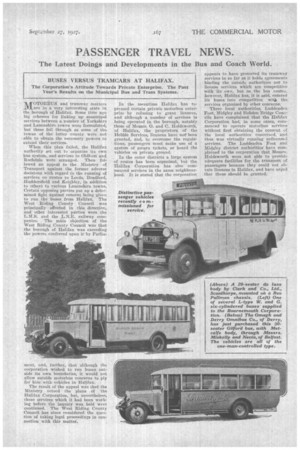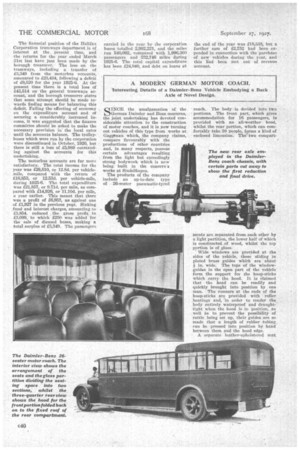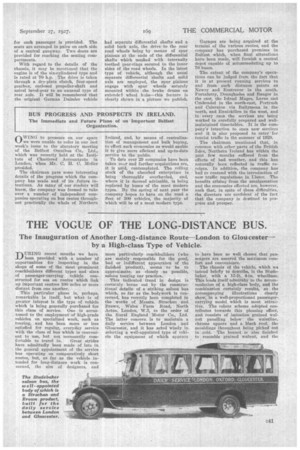PASSENGER TRAVEL NEWS.
Page 61

Page 62

Page 63

If you've noticed an error in this article please click here to report it so we can fix it.
The Latest Doings and Developments in the Bus and Coach World.
ATOTORBUS and tramway matters are in a very interesting state in the borough Of Halifax. Some time ago big schemes for linking up municipal set-vim& between a number of Yorkshire and Lancashire towns Were formulated, but these fell through as some of the towns of the latter county were not able to obtain the necessary powers to extend their services.
When this plan failed,. the Halifax authority set out to organize its own bus system, and services to Oldham and Rochdale were arranged. Then followed an appeal to the Ministry of Transport against the former adverse decisions with regard to the running of services on routes to Leeds, Bradford, Huddersfield and Keighley, in addition to others to various Lancashire. towns. Certain opposing parties put up a determined fight against consent being given to run the buses from Halifax. The West Riding Comity Council was principally affected in this direction,. and other interested parties were the L.M.S. and the railway companies. The main objection Of the West Riding County Council was that the borough of Halifax was exceeding the powers conferred upon it by raffia
meat, and, further, that although the corporation wished to run buses outside its own boundaries, it would not allow outside motorbus concerns to ply for hire with vehicles in Halifax.
The result of the appeal was that the Ministry vetoed the plans of the Halifax Corporation,, but, nevertheless, those services which it had. been working before the inquiry was held were continued. The West Riding County Council has since considered the question of taking legal proceedings in connection with this matter. In the meantime Halifax has repressed certain private motorbus enterprise by refusing to grant lieences, and although a number of services is being operated in the borough, notably those of Messrs. 0. and C. Holdsworth, of Halifax, the proprietors of the Hobble Services, licences have not been granted, and, to overcome the regulations, passengers must make use of a system of return tickets, or board the vehicles on private ground.
In the outer districts a large system of routes has been organized, but the Halifax Corporatioti has also commenced services in the same neighbourhood. It is stated that the corporation appears to have protected its tramway services in so far as it holds agreements binding the outside authorities not to license services which are Competitive with its own, but On the bus routes, however, Halifax has, it is said, entered Its buses into competition witja. the services organised by other concerns.
Three local authorities, Luddenden Foot, Midgley and Hebden Bridge Councils have complained that the Halifax Corporation had, in some cases, commenced to operate motorbus services without first obtaining the consent of the local authorities concerned, and thus was virtually running unlicensed services. The Luddenden Foot anti Midgley district authoritieshave Complained to the corporation that Messrs. Holdsworth were not able to provide acjequate facilities for the transport of passengers because they could not obtain licences in Halifax, and have urged that these should be granted.
The financial position of the Halifax Corporation tramways department is of interest at the present time, and the returns for the year ended March 31st last have just been made by the borough treasurer. The loss on the tramways, including a transfer of 3,349 from the motorbus accounts, amounted to 128,434, following a deficit of 19,520 for the year 1925-6. At the present time there is a total loss of £43,514 on the general tramways account, and the borough treasurer states that some attempt should be made towards finding means for balancing this deficit, Failing the effecting of economy on the expenditure account and of securing a considerably increased income, it was suggested that the finance committee should be asked to make the necessary provision in the local rates until the accounts balance. The trolleybuses which were run by the corporation were discontinued in October, 1926, but there is still a loss of 5..5,989 outetandbig against the accounts for this undertaking.
The motorbus accounts are far more satisfactory. The total income for the year was £28,810, or 12.8d. per vehielemile, compared with the return of £16,853, or 12.53d. per vehicle-mile, during 1025-6. The total expenditure Was £21,857, or 9.71d. per mile, as compared with £14,926, or 11.10d. per mile, a rear earlier. This meant that there was a profit of £6,953, as against one of £1,927 in the previous year. Sinking fund and interest charges, amounting to 13,854, reduced the gross profit to 18,099,to which £250 was added for the sale of disused buses, making a total surplus of £3,349. The passengers
carried in the year by the corporation buses totalled 2,992,221, and the miles run 540,092, compared with 1,996,360 passengers and 332,746 miles during 1925-6. The total capital expenditure has been £24,040, and debt on loans at INCE the amalgamation of the OG'ernian Daimler and gene concerns, the joint undertaking has devoted considerable attention to the construction Of motor coaches, and it is now turning out vehicles of this type from works at Claggenau which, the company claims, compare favourably with the productions of other countries and, in many respects, possess certain advantages resulting from the light but exceedingly strong bodywork which is now being built in the concern's works at Sindelfingen.
The products of the company include an up-to-date type of 26-seater pneumatic-tyred the end of the year was £18,538, but a further sum of £2,752 had been expended in connection with the purchase of new vehicles during the year, and this had been met out of revenue account.
coach. The body is divided into two portions. The front part, which gives accommodation for 16 passengers, is provided with an all-weather hood, whilst the rear portion, which can comfortably tole 10 people, forms a kind of enclosed limousine. The two comport
ments arc separated from each other by a light partition, the lower half of which is constructed.of wood, whilst the top portion is of glass. Wide windows are provieled at the sides of the vehicle, these sliding in plated brass guides which are about in. wide. The tops of the windowguides in the open part of the vehicle form the support for the hoop-sticks which carry the hood. It is claimed that the head can be readily and quickly brought into position by one man. The runners at the ends of the hoop-sticks are provided with roller bearings and, in order to tender the body entirely waterproof and draughttight when the hood is in position, as well as to prevent the possibility of rattle being set up, their guides are so made that a length of rubber tubing can be pressed into position by hand between them and the hood edge.
A separate leather-upholstered seat for each passenger is provided. The seats are arranged in pairs on each side of a central gangway. Two doors are provided for reaching the seating compartments.
With regard to the details of the chassis, it may be mentioned that the engine is of the six-cylindered type and is rated at 70 h.p. The drive is taken through a dry-plate clutch, four-speed gearbox, enclosed propeller-shaft and spiral bevel-gear to an unusual type of rear axle. It will be remembered that the original German Daimler vehicle
OWING to pressure on our space we were linable to refer in our last week's issue to the statutory meeting of the Belfast Omnibus Co., Ltd., which was recently held at the Institute of Chartered Accountants in London, when Mr. C. H. C. Moller presided.
The chairman gave some interesting details of the progress which the company has made and of its future intentions. As many of our readers will know, the company was formed to take over a number of independent companies operating on bus rautee throughout practically the whole of Northern
had separate differential shafts and a solid back axle, the drive to the rear road wheels being by means of spur Pinions at the ends of the differential shafts which meshed with internally toothed gear-rings secured to the inner sides of the road wheels. In the latest type of vehicle, although the usual separate differential shafts and solid axle are employed, the spur pinions engage with spur wheels securely mounted within the brake• drums on extended wheel hubs—this festrire is clearly shown in a picture we publish.
Ireland, and, by means of centralization of management and hulk buying, to effect such economies as would enable it to give more efficient and up-to-date service to the public.
To date over 29 companies have been taken over and further acquisitions are, it is said, contemplated. The rolling stoek of the absorbed enterprises is being thoroughly overhauled, and, where it is deemed advisable, is being replaced by buses of the most modern types. By the spring of next year the company hopes to have on the road a fleet 'of 200 vehicles, the majority of which will be of a most modern type. Garages are being acquired at the termini of the various routes, and the company has purchased premises in Belfast which, when final alteratione have been made, will furnish a central depot capable of aceammodating up to 70 buses.
The extent of the company's operations can be' judged from the fact that it is at present running services to and from such distance points as Newry and Rostrevor in the south, Portaferry, Donag,hadee and Bangor in the east, the Island Magee, Larne and Cushendal in the north-east, Porttush and Coleraine via Ballymena in the north, and Enniskillen in the west, and in every case the services are being worked to carefully prepared and wellmaintained time-tables. It is the company's intention to open new services and it is also proposed to cater 'for tourist traffic in the summer of 1928.
The chairman mentioned that, in common with other-parts of the British Islee, Northetn Ireland has within the past few months suffered from the effects of bad weather, and this has naturally been reflected in traffic receipts. In addition, the company has had to contend with the introduction of new traffic regulations in Ulster. The benefits arising from the amalgamation and the economies effected are, however, such that, in spite of these difficulties, the direetots are confident of the fact that the company is destined to progress and Prosper.












































































































